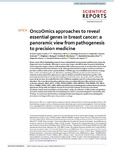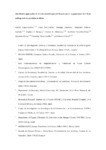Mostrar o rexistro simple do ítem
OncoOmics approaches to reveal essential genes in breast cancer: a panoramic view from pathogenesis to precision medicine
| dc.contributor.author | López-Cortés, Andrés | |
| dc.contributor.author | Paz-y-Miño, César | |
| dc.contributor.author | Guerrero, Santiago | |
| dc.contributor.author | Cabrera-Andrade, Alejandro | |
| dc.contributor.author | Munteanu, Cristian-Robert | |
| dc.contributor.author | González-Díaz, Humberto | |
| dc.contributor.author | Pazos, A. | |
| dc.contributor.author | Pérez-Castillo, Yunierkis | |
| dc.contributor.author | Tejera, Eduardo | |
| dc.contributor.author | Barigye, Stephen J. | |
| dc.date.accessioned | 2020-04-03T10:04:01Z | |
| dc.date.available | 2020-04-03T10:04:01Z | |
| dc.date.issued | 2020-03-24 | |
| dc.identifier.citation | López-Cortés A, Paz-y-Miño C, Guerrero S, et al. OncoOmics approaches to reveal essential genes in breast cancer: a panoramic view from pathogenesis to precision medicine. Sci Rep. 2020; 10:5285 | es_ES |
| dc.identifier.issn | 2045-2322 | |
| dc.identifier.uri | http://hdl.handle.net/2183/25298 | |
| dc.description.abstract | [Abstract] Breast cancer (BC) is the leading cause of cancer-related death among women and the most commonly diagnosed cancer worldwide. Although in recent years large-scale efforts have focused on identifying new therapeutic targets, a better understanding of BC molecular processes is required. Here we focused on elucidating the molecular hallmarks of BC heterogeneity and the oncogenic mutations involved in precision medicine that remains poorly defined. To fill this gap, we established an OncoOmics strategy that consists of analyzing genomic alterations, signaling pathways, protein-protein interactome network, protein expression, dependency maps in cell lines and patient-derived xenografts in 230 previously prioritized genes to reveal essential genes in breast cancer. As results, the OncoOmics BC essential genes were rationally filtered to 140. mRNA up-regulation was the most prevalent genomic alteration. The most altered signaling pathways were associated with basal-like and Her2-enriched molecular subtypes. RAC1, AKT1, CCND1, PIK3CA, ERBB2, CDH1, MAPK14, TP53, MAPK1, SRC, RAC3, BCL2, CTNNB1, EGFR, CDK2, GRB2, MED1 and GATA3 were essential genes in at least three OncoOmics approaches. Drugs with the highest amount of clinical trials in phases 3 and 4 were paclitaxel, docetaxel, trastuzumab, tamoxifen and doxorubicin. Lastly, we collected ~3,500 somatic and germline oncogenic variants associated with 50 essential genes, which in turn had therapeutic connectivity with 73 drugs. In conclusion, the OncoOmics strategy reveals essential genes capable of accelerating the development of targeted therapies for precision oncology. | es_ES |
| dc.description.sponsorship | Instituto de Salud Carlos III; PI17/01826 | es_ES |
| dc.language.iso | eng | es_ES |
| dc.publisher | Springer Nature | es_ES |
| dc.relation.uri | https://doi.org/10.1038/s41598-020-62279-2 | es_ES |
| dc.rights | Atribución 3.0 España | es_ES |
| dc.rights.uri | http://creativecommons.org/licenses/by/3.0/es/ | * |
| dc.title | OncoOmics approaches to reveal essential genes in breast cancer: a panoramic view from pathogenesis to precision medicine | es_ES |
| dc.type | info:eu-repo/semantics/article | es_ES |
| dc.rights.access | info:eu-repo/semantics/openAccess | es_ES |
| UDC.journalTitle | Scientific Reports | es_ES |
| UDC.volume | 10 | es_ES |
| UDC.startPage | 5285 | es_ES |
Ficheiros no ítem
Este ítem aparece na(s) seguinte(s) colección(s)
-
GI-RNASA - Artigos [176]
-
INIBIC-RNASA-IMEDIR - Artigos [46]







